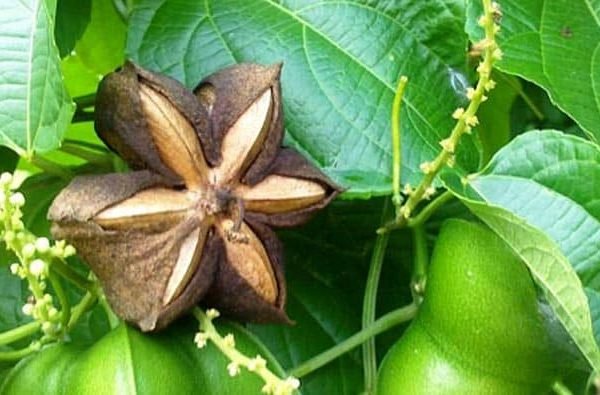Sacha inchi (Plukenetia volubilis, Euphorbiaceae) is a Peruvian plant that grows from 330 ft. to about 6500 ft. above sea level.1 The wild and cultivated vine is found in both the low and high jungle regions of Peru in the departments of Cusco, San Martin, and Madre de Dios. The plant produces edible seeds also known as Inca peanut, Peruvian peanut, and mountain peanut due to the nut-like flavor of the roasted seeds.2 The seeds and oil contain α-linolenic acid (ALA, an omega-3 fatty acid) as well as linoleic acid (LA, an omega-6 fatty acid).1 They also contain protein, sterols, and tryptophan.1,2 The leaves have been reported to contain terpenoids, saponins, flavonoids, and other components responsible providing antioxidant and antiproliferative activities.3
Traditionally, sacha inchi oil is used in skin care, especially to maintain skin softness, as well as for the treatment of wounds, insect bites, and skin infections.4 Known to indigenous people of the Peruvian Amazon basin for thousands of years, the plant is depicted on vessels in Incan tombs.5 Tribal groups extract the oil from the seeds, as well as roast the seeds and cook the leaves for use in their meals.
Sacha inchi oil may be beneficial in the treatment of high cholesterol, depression, and diabetes, aid in weight loss, and promote cardiovascular health.2 However, more clinical studies are needed to confirm these benefits.
References
1Gonzales GF, Gonzales C. A randomized, double-blind placebo-controlled study on acceptability, safety and efficacy of oral administration of sacha inchi oil (Plukenetia volubilis L.) in adult human subjects. Food Chem Toxicol. March 2014;65:168-176.
2Wong C. The benefits of sacha inchi. About Health website. http://altmedicine.about.com/od/herbsupplementguide/a/Sacha-Inchi.htm. September 16, 2015. Accessed December 8, 2015.
3Nascimento AKL, Silveira RFM, Santos ND, Fernandes JM, Zucolotto SM, Rocha HAO, Scortecci KC. Antioxidant and antiproliferative activities of leaf extracts from Plukenetia volubilis Linneo (Euphorbiaceae) Evid-Based Complemt Alternat Med. 2013;2013:950272. doi: 10.1155/2013/950272.
4Gonzalez-Aspajo G, Belkhelfa H, Haddioui-Hbabi L, Bourdy G, Deharo E. Sacha inchi oil (Plukenetia volubilis L.), effect on adherence of Staphylococus aureus to human skin explant and keratinocytes in vitro. J Ethnobot. 2015;171:330-334.
5Herbs America. Sacha inchi. Herbs America website. https://herbs-america.com/amazone-therapeutic/sacha-inchi/. Accessed December 8, 2015.

